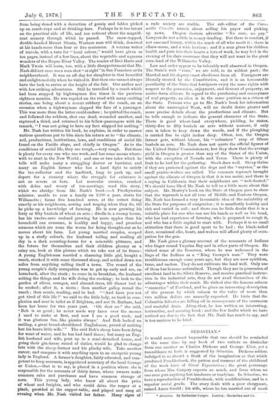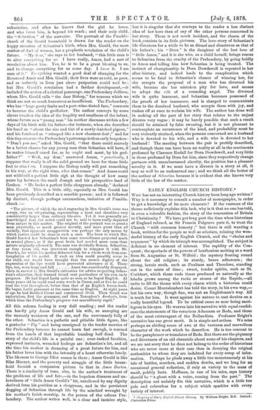SEBASTIAN.*
Jr would seem almost impossible that one should be reminded at the same time by any book of two writers so dissimilar from one another as Charles Dickens and George Eliot, yet a resemblance to both is suggested by Sebastian. Dickens seldom indulged in so absurd a freak of the imagination as that which produced Pumblechook, the patron and torment of the childhood of the weak hero of Great Expectations; the great personage from whom Mrs. Gargery expects so much, and from whom no, one ever gets anything but insolence or toadyism. In Sebastian, we have a reproduction of Pumblechook, with modifications, and in a superior social grade. The story deals with a poor clergyman, named Amos Gould ; his wife, whom he has married out of meek
* Sebastian. By lialbatine Cooper. London : Macmillan and Co.
submission, and after he knows that the girl he loves, and who loves him, is beyond his reach ; and their only child, the "Sebastian " of the narrative. The portrait of the Fumble- chook of the Gould household is drawn for the reader on the happy occasion of Sebastian's birth, when Mrs. Gould, the most matter-of-fact of women, has a prophetic revelation of the child's
future. "My dear," she says to her husband, "this little man is to alter everything for us. I have really, Amos, had a sort of revelation about him. Yes, he is to be a great blessing to us, and to change everything for us some day. I know it. I am sure of it." Everything wanted a good deal of changing for the Reverend Amos and Mrs. Gould ; their lives were as cold, as poor, and as unlovely as lives just above pauperism could well be ;
but Mrs. Gould's revelation had a farther development,—it included the action of a clerical personage, one Prebendary Jellicoe, whom Mrs. Gould calls "the dear Bishop," for reasons which we think are not so much humorous as insufficient. The Prebendary, who has "huge gouty limbs and a port-wine-tinted face," consents to become the child's godfather. The author conveys by some clever touches the idea of the fragility and smallness of the infant, whose future as a "young man" his mother discusses within a few days of his birth with his father—for instance, when she describes his hand as "about the size and tint of a newly-hatched pigeon," and his forehead as "crimped like a new chestnut-leaf ;" and for this tiny creature the Prebendary's patronage is thus early bespoken : "Don't you see," asked Mrs. Gould, "that there could scarcely be a better chance for any young man than Sebastian will have, if he makes himself cared for, as he ought and must, by his god- father ?" " Well, my dear," answered Amos, "practically, I suppose that really is all the solid ground we have for these little feet to stau] on. I suppose the Bishop really will put something in his way, at the right time, when that comes." And Amos could not withhold a patient little sigh at the thought of how many years lay between the small Joseph and his prospective land of Goshen. "lie looks a perfect little clergyman already," declared Mrs. Gould. This is a little silly, especially as Mrs. Gould has been previously described as a sensible person; and it is followed by distinct, though perhaps unconscious, imitation of rumble. chook :— "The picture, of which the steel engraving in Mrs. Gould's room was a copy, was an oil-painting, representing a head and shoulders very considerably larger than ordinary life-size. Yet it was generally ac- knowledged that the artist could not be said to have really departed from nature in this matter. The original of the portrait was so great a man physically, so much greater morally, and more great than all socially, that apparent exaggeration was perhaps the only means by which justice could be done in such a case. The brow to which Mrs. Gould fancied her Sebastian's bore some resemblance projected much in several places, as if the great brain had needed more room than nature originally allowed it. The nose was decidedly Roman. Sebastian, at four years old, was irreverent enough to compare it with Mr. Punch's, for which his mother debarred him for a whole week from con- templation of his model. If such an idea could possibly occur to the child, one would have thought that the severe dignity of the expression of the lips would have prevented utterance of it. Those
lips, too, were large and full Amos was considerably dismayed, when in answer to Mrs. Gould's entreaties for advice respecting Sebas- tian's education, their learned friend sent particulars of his own early progress. 1-le had lisped Latin quite as soon as he lisped English. At three years old he could read some words in Caisar, and at five he could read the text throughout, better than that of an English lesson-book. He began Latin grammar at the same time as English. At eight years of age he had finished Cxsar and commenced Ovid. Then Greek was undertaken, first the grammar, and then Xenophon's Anabasis, from which time the Prebendary's progress was marvellously rapid."
All this solemn fooling is very dull reading ; and the reader can hardly pity Amos Gould and his wife, so annoying are the unmanly weakness of the one, and the unwomanly folly of the other. Sebastian is a pathetic and pitiable little figure, like genteeler " Pip " and being consigned to the tender mercies of the Prebendary because he cannot learn fast enough, is rescued from the hands of that improbable humbug half-dead. The story of the child's life is a painful one ; over-tasked faculties, repressed instincts, wounded feelings are Sebastian's lot, and all the time his mother is dreaming of a great future for him, and his father loves him with the intensity of a heart otherwise lonely. The likeness to George Eliot comes in there ; Amos Gould is like Silas Manlier, and the poverty and struggle of the little house- hold furnish a companion picture to that in Amos Barton. There is a similarity of tone, also, in the author's treatment of the problems of life and fate,—in the hopeless dimness and un - loveliness of "little Amos Gould's" lot, unrelieved by any dignity derived from his position as a clergyman, and in the persistent .dogging of Sebastian through life by the mischief wrought by his mother's fetish-worship, in the person of the odious Pre- bendary. The author writes well, in a clear and incisive style,
but it is singular that she conveys to the reader a less distinct idea of her hero than of any of the other persons concerned in her story. There is not much incident, and the charm of the book consists in its little pictures. The love-story of Sebastian's life threatens for a while to be as dismal and disastrous as that of his father's ; his " Dora " is the daughter of the lost love of "little Amos," and it is she who, as a child herself, brings rescue to Sebastian from the cruelty of the Prebendary, by going boldly to Amos and telling him how Sebastian is being treated. The instinct of championship in Dora Dowdswell is repeated in her after-history, and indeed leads to the complication which seems to be fatal to Sebastian's chance of winning her, for she accepts the proposal of a man who has divorced his wife, because she has mistaken pity for love, and means to adopt the ,-tile of a consoling angel. The divorced wife is quite innocent, and Sebastian becomes possessed of the proofs of her innocence, and is charged to communicate them to the deceived husband, who accepts them with joy, and rushes off at once to reclaim his wife. The author has done well in making all the part of her story that relates to the unjust divorce very vague ; it may be barely possible that such a result should be attained by false swearing, but it is not pleasant to contemplate an occurrence of the kind, and probability must be very violently strained, when the persons concerned are a husband who is devoted to his wife, and a wife who is devoted to her husband ! The meeting between the pair is prettily described, and though there can have been no reality at all in the sentiments professed by Clarence Rudall for Dora Dowdswell, and very little in those professed by Dora for him, since they respectively change partners with unembarrassed alacrity, the position has a pleasant novelty in it. If we must have a divorce in a story at all, it may as well be an undeserved one ; and we think all the better of the author of Sebastian because it is evident that she knows very little of the law of the matter.



































 Previous page
Previous page